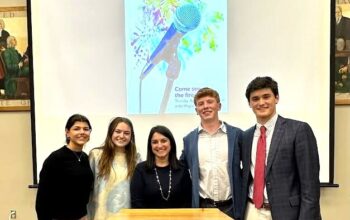Cat Levine, Reporter
@catcourant
Every year, seniors who organize creative writing clubs like the Spectator, Outliers, or Comme Ça leave for college and begin passing their legacy down to their successors. For the past four years, they have participated in or led groups of poetry that have caused students to connect and learn more about one another through events such as Poetry Fest. While they are considering their futures, seniors and their peers reflect on their experiences with poetry in the high school.

For junior and co-editor of the Spectator Julia Means, who works alongside other senior editors, a major component of poetry is the school curriculum. “I find that my english teachers have greatly influenced my interest in poetry,” Julia said. “I had Mr. Darken last year, and he helped me unravel my creative talent, while Ms. Hamill is very encouraging of whatever issue you want to explore; having that combination is really inspiring.”
Senior poet Jordan Smith finds the inspiration Julia has from her teachers in Somali-British author Warsan Shire. “I enjoy her writing because although she is young, it tends to carry so much heartache. She is often a voice for the voiceless, writing about immigration, family, women, and desolation,” Jordan said. “Her writing opens the eyes of our generation, and it is important especially coming from someone in it.”
Senior Miles Turpin believes that performance pieces give him the opportunity to put his ideas on paper. “Poetry is a way to figure things out, a lot of times this sounds abstract and obtuse,” he said. “But it’s taking what’s in your subconscious and channeling it into the language you are exploring.”
Senior and editor of Comme Ça Zoe Jensen sees that by reading poetry aloud, the audience can find similarities in themes. “I think my poetry can speak to others whether they want it to or not,” she said. “It is ultimately the readers’ choice whether they can find a connection within my writing or not.”
Julia hopes that her work in the end can connect with readers in after school writing clubs. “Most of the greats were not great until they were dead, and as a high school student I hope I can at least have a beneficial impact on those involved and who read the Spectator.”
Jordan sees a difference in the tone of her poetry as she experiments with various styles of poetry, such as spoken word. “I’ve taken a much broader, worldly approach to poetry,” she said. “It’s not so much me conveying my emotions and more so me conveying a message.”
Julia concludes that poetry can be utilized to promote recognition in the school community to bring awareness to certain issues. “Like any great writing piece, I believe that poetry will influence others to get more involved in the controversial topic at hand,” Julia said.

While writing poetry in class can sometimes be strict, Zoe feels that she is able to adapt to the curriculum. “We have to write so many pretentious things that seem forced for school purposes, and most people don’t want to do that because it isn’t true to themselves,” she said. “I try to write poetry that is true to myself while staying within classroom guidelines”
Jordan sees that by coming together in a room to read aloud one another’s work, people can learn more about both the author and themselves. “You get to hear the emotion within the person who’s saying it. When you read something you might take it a different way then from what the author intended,” Jordan said. “In spoken word, the author can convey the message in a way that emphasizes their style.”
Julia sees poetry as an emerging interest that is a central part of the school environment. “It’s been around for a long time, there are so many talented people who come through these halls. However, the issue is getting the word out more,” Julia said. “You don’t really know someone unless you read their poetry because that is where they truly and freely speak their mind.”

Jordan also recognizes poetry as a way to connect with fellow peers at the high school. “It gives students the opportunity to relate to others on a different level, that’s what the poetry language is all about- human experience and how an author can make you feel something.”
Even though he will soon be graduating, Miles hopes that the gains that come from writing will give students the initiative to continue when he departs. “Poetry brings people together, it’s all about what you don’t know. If we can all appreciate this idea of exploring instead of knowing, than others can understand the underlying message behind poetry,” Miles said.



